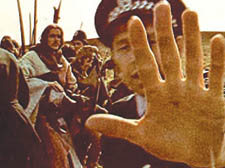|
|
 |
| |
Christ, Nietzsche and Pythons
Julian Doyle helped make some of the most famous comedy films ever. Now he has written a play that links a German nihilist philosopher with Wagner, writes Dan Carrier
CLIP CLOP, clip clop: the famous scene in Monty Python’s Holy Grail of the knight and his sidekick appearing over the crest of a hill has tickled thousands of cinema-goers.
But few will know that, while the use of coconut shells instead of real horses has become a classic joke, the real reason they became part of the shot was not because of the mirth-inducing nature of the idea, but because the Python team had run out of money.
And not only were the horses replaced by coconut shells, the shoot was done early one morning on Hampstead Heath, as the planned location in Scotland was financially out of the question.
Julian Doyle, who worked with the Pythons as an editor and special effects chief, set the scene up as it was a stone’s throw from his house in Gospel Oak. He even shot some of the final scenes in his back garden, drawing on all the trickery he could muster.
Now he has written a play which brings German nihilist philosopher Frederick Nietzsche together with composer Richard Wagner. Twilight of the Gods is set in the Turin Lunatic Asylum where Nietzsche was once held. He is visited by the ghost of Wagner and this disastrous meeting provides the meat of the play. Julian says he was inspired to write it after hearing the story of how Frederick Nietzsche and Richard Wagner had been friends but mysteriously fell out. Soon after, Wagner died while Nietzsche had a breakdown.
He admits that writing about a philosopher whom even the most dedicated students can find confusing, depressing and tainted (though some say unfairly) with the rise of Fascism was a challenge, made more interesting by adding Hitler’s favourite composer to the mix.
“I must have been mad myself to try to tackle such a subject,” says Julian. “I play the action of the drama to Wagner's music and used the format of Wagner's opera The Flying Dutchman to have Wagner unable to leave Nietzsche's cell until he can redeem himself or have someone sacrifice themselves for his redemption.”
Such adventurous undertakings have been a pattern for Julian’s work. After all, he has played major roles behind the scenes on films that sent Pythons looking for the Holy Grail, turned the crucifixtion of Christ into a raucous comedy, and got together a band of time-travelling dwarves who steal a map of the universe from God.
Of the Holy Grail, Julian recalls: “We had very little money to make a feature film up in Scotland. When we got back from Scotland we were still missing several scenes, so I shot the Black Knight scene in Epping Forest and lots of bits in my back garden in Gospel Oak. In fact, the opening shot of the film I did one morning over Hampstead Heath by the side of West Heath Road. Arthur and his squire Patsy riding over the brow of a hill. Well not quite riding – just banging coconuts together. Well, what do you want for £164,000? Horses?”
Julian went to Haverstock School and his father was the late Bob Doyle, the renowned Tufnell Park based International Brigader who fought Franco in Spain in the 1930s.
When he left school he got a job as a junior lab technician in a small research team at University College Gower Street, under Professor Peter Medawar. Just three months after Julian arrived there in 1960, Professor Medawar won the Nobel Prize in Physiology of Medicine. The enormity of the achievement did not really sink in, he admits.
“I was young,” he says, “and I thought winning Nobel prizes was par for the course.”
Julian studied at the London Film School and then got a job working with Monty Python which led to his involvement in some of the seminal moments of British comedy.
As well being the chief editor on The Life of Brian, he even made the odd appearance in Python films: he is the last person to be seen in shot in the Holy Grail – dressed as a policeman, he tells the crew it’s time to stop filming, and places his hand over the camera.
He recalls that the usual movie moguls and studios were not keen to stump up the money. But luckily the Pythons were well-connected enough to get others involved.
He says: “We managed to raise just £164,000 to do the Holy Grail. It didn’t come from the film industry but from Pink Floyd, Led Zeppelin and Island Records.”
Highgate-based Python star Terry Gilliam was so impressed with Julian’s work he hired him to work on arguably the director’s two finest pictures: Time Bandits and Brazil. Julian edited them both and worked on the ground-breaking special effects that brought Gilliam’s eccentric imagination to life. Other work saw him direct his own film, the marvellously odd Chemical Wedding about the black magic guru Aleister Crowley, and work with Iron Maiden on pop videos.
But it is the Monty Python work that has left the biggest mark.
“I am happy to say that Holy Grail was, believe it or not, Elvis’s favourite,” he says with pride.
|

|
 |
| |
|
 |
|

